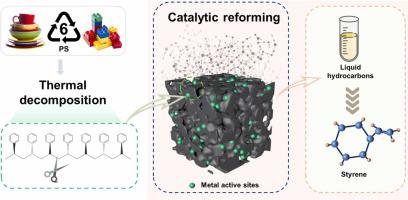当前位置:
X-MOL 学术
›
J. Anal. Appl. Pyrol.
›
论文详情
Our official English website, www.x-mol.net, welcomes your
feedback! (Note: you will need to create a separate account there.)
Catalytic fast pyrolysis over heavy metals-containing livestock manure biochar catalyst for polystyrene upcycling
Journal of Analytical and Applied Pyrolysis ( IF 5.8 ) Pub Date : 2024-04-03 , DOI: 10.1016/j.jaap.2024.106492 Ziyi Zhang , Qing Cheng , Chun Shan , Yuan Jiang , Ge Kong , Guanyu Zhang , Suchithra Thangalazhy Gopakumar , Suan Shi , Xuesong Zhang , Lujia Han
Journal of Analytical and Applied Pyrolysis ( IF 5.8 ) Pub Date : 2024-04-03 , DOI: 10.1016/j.jaap.2024.106492 Ziyi Zhang , Qing Cheng , Chun Shan , Yuan Jiang , Ge Kong , Guanyu Zhang , Suchithra Thangalazhy Gopakumar , Suan Shi , Xuesong Zhang , Lujia Han

|
The perpetual market demand for polystyrene results in the gradual accumulation of polystyrene waste, placing a serious burden on the environment. This study proposed a promising method to upcycle polystyrene for styrene-derived monomers through catalytic fast pyrolysis. The metals-incorporated biochar catalysts were synthesized from heavy metals-contaminated manure waste for catalytic fast pyrolysis of polystyrene. The experimental results showed that the bimetallic biochar-derived catalyst containing Zn and Cr (Zn-Cr/C) was more conducive to the liquid production, with an extremely high yield of 88.22 wt%. Monometallic Pb-incorporated biochar catalyst (Pb/C) and bimetallic Zn-Cu co-doped on biochar (Zn-Cu/C) were more favorable for the production of pure styrene, with the mass yield of 61.26 wt% and 60.39 wt%, respectively. Additionally, the study elucidated a deep understanding of the reaction mechanisms involved in the catalytic fast pyrolysis of polystyrene. Simply put, this study introduced a new concept to convert heavy metal-contaminated animal manure into metal-incorporated biochar catalysts for catalytic conversion of polystyrene waste in pure styrene-based monomers.
中文翻译:

含重金属畜禽粪便生物炭催化剂快速热解聚苯乙烯升级改造
市场对聚苯乙烯的持续需求导致聚苯乙烯废料逐渐积累,给环境造成严重负担。这项研究提出了一种通过催化快速热解将聚苯乙烯升级为苯乙烯衍生单体的有前景的方法。以重金属污染的粪便废物为原料合成了掺入金属的生物炭催化剂,用于催化聚苯乙烯的快速热解。实验结果表明,含Zn和Cr的双金属生物炭催化剂(Zn-Cr/C)更有利于产液,收率高达88.22 wt%。单金属掺Pb生物炭催化剂(Pb/C)和生物炭共掺杂双金属Zn-Cu催化剂(Zn-Cu/C)更有利于纯苯乙烯的生产,质量收率分别为61.26 wt%和60.39 wt% , 分别。此外,该研究阐明了对聚苯乙烯催化快速热解所涉及的反应机制的深入理解。简而言之,这项研究引入了一种新概念,将受重金属污染的动物粪便转化为掺金属生物炭催化剂,用于将聚苯乙烯废物催化转化为纯苯乙烯基单体。
更新日期:2024-04-03
中文翻译:

含重金属畜禽粪便生物炭催化剂快速热解聚苯乙烯升级改造
市场对聚苯乙烯的持续需求导致聚苯乙烯废料逐渐积累,给环境造成严重负担。这项研究提出了一种通过催化快速热解将聚苯乙烯升级为苯乙烯衍生单体的有前景的方法。以重金属污染的粪便废物为原料合成了掺入金属的生物炭催化剂,用于催化聚苯乙烯的快速热解。实验结果表明,含Zn和Cr的双金属生物炭催化剂(Zn-Cr/C)更有利于产液,收率高达88.22 wt%。单金属掺Pb生物炭催化剂(Pb/C)和生物炭共掺杂双金属Zn-Cu催化剂(Zn-Cu/C)更有利于纯苯乙烯的生产,质量收率分别为61.26 wt%和60.39 wt% , 分别。此外,该研究阐明了对聚苯乙烯催化快速热解所涉及的反应机制的深入理解。简而言之,这项研究引入了一种新概念,将受重金属污染的动物粪便转化为掺金属生物炭催化剂,用于将聚苯乙烯废物催化转化为纯苯乙烯基单体。































 京公网安备 11010802027423号
京公网安备 11010802027423号